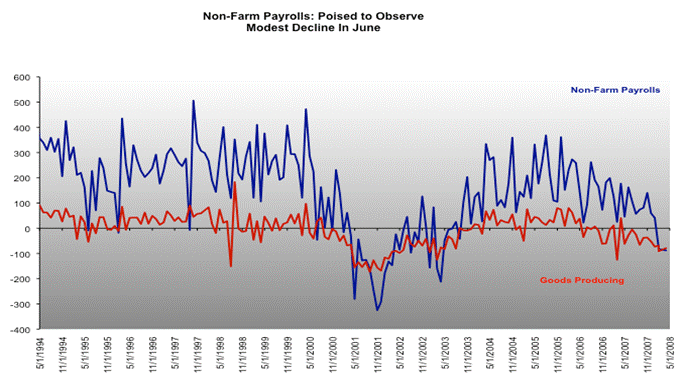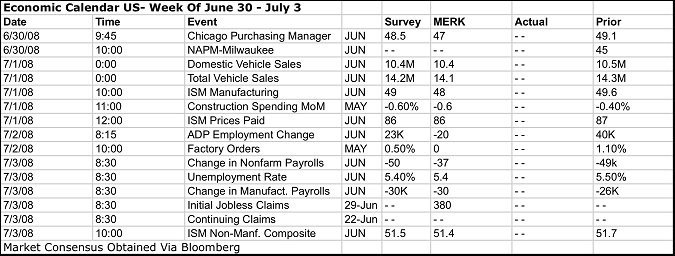Economic Forecasts and Analysis For US Financial Markets (June 30-July 4)
Economics / US Economy Jun 30, 2008 - 01:21 AM GMTBy: Joseph_Brusuelas

 The country may be celebrating its independence, but the markets will see a week of very important data and an address on the financial crises and the economy from the Fed and US Treasury. The major events of the week will be the publication of the June non-farm payrolls report on Thursday. Wednesday will see an address on the economy by US Treasury Secretary Paulson and a talk on the current global financial disruption by FOMC Gov. Mishkin.
The country may be celebrating its independence, but the markets will see a week of very important data and an address on the financial crises and the economy from the Fed and US Treasury. The major events of the week will be the publication of the June non-farm payrolls report on Thursday. Wednesday will see an address on the economy by US Treasury Secretary Paulson and a talk on the current global financial disruption by FOMC Gov. Mishkin.
Monday will see the release of the Chicago PMI and total vehicle sales for June. The June estimate of the ISM will be published the following day, with factor orders and the ADP employment estimate the primary data released on Wednesday. The week will conclude with the aforementioned June non-farm payrolls data, the ISM non-manufacturing survey and the weekly jobless claims series.
Fed Talk
The week of June 30-July 4 will see a truncated week of Fed talk. July 1 will see Atlanta Fed President Lockart speak on the economic outlook and financial turmoil. The following day US Treasury Secretary Paulson will speak on the markets and the economy. FOMC Gov. Mishkin will speak on “The Global Financial Disruption and the World Economy” at a conference in Israel. Time TBA.
Chart of The Week


Chicago PMI (June) Monday 09:45 AM
The general headline business barometer should see a decline to 47.0 for the month of June on the back of a weak month of new orders and a sharp rise in the cost of production. We have for some time thought that the manufacturing industry would experience a very rough month of June. Our below market forecast is specifically predicated on the weak response in motor vehicle assemblies post settlement of the American Axel strike. Given the very real problems in the auto industry we think that the published production schedules out of Detroit will prove to have been overoptimistic in retrospect and provide a continuing deadweight on economic activity in the upper Midwest for some time to come.
Total Vehicle Sales (June) Monday Afternoon
When one takes a look at the carnage in the auto industry due to the steep climb in the price of gasoline the idea that the rebate checks afforded consumers by the Federal government will provide a net boos to domestic auto sales looks quite suspect. Year to date, the sale of light duty truck and SUV's which have been the bread and butter of Detroit for the past decade, are down -15.7% and -25.3% respectively. Total sales for cars are flat year over year and we do not see any material improvement for the month. Our forecast implies domestic sales will fall to 10.4mln units and the total vehicle sales to 14.1mln for the month of June.
ISM Manufacturing (June) Tuesday 10:00 AM
The sharp increase in the cost of production should take a healthy bite out of industrial activity in June. Our forecast implies a decline in the headline manufacturing index to 48.0 for the month, which would be the fifth consecutive reading indicating contraction in the industrial sector. The primary culprit for the decline, in addition to the aforementioned rise in prices paid, should be the seventh consecutive reading indicating contraction in the new orders component, with a healthy risk to the downside emanating from the continued retrenchment in the domestic auto industry. The combined impact of rising costs and diminished demand from domestic sources should be expected to push the production component back into terrain indicating contraction and provide the foundation for a very pessimistic report to end the second quarter of 2008.
ADP Employment Change (June-25) Wednesday 08:15 AM
We expect that the ADP forecast will catch up with the reality of continuing retrenchment in the labor sector and report a net subtraction of -20k in payrolls for the month of June. After a few months of overshooting the mark, the gents at Macroeconomic Advisers who provide the estimate, should make the adjustments in the model necessary to account for the modest amount of bloodletting that continues to define an economy basically moving sideways.
Factory Orders (May) Wednesday 10: 00 AM
Another flat month of orders for durables signals that factor orders should see a equally dreary outcome. Although, the shipments category can be expected to advance slightly, other than a decent month of orders for civilian aircraft and a pickup in activity at the Department of Defense, there is little to write home about in the manufacturing sector.
Jobless Claims (Week Ending 28 June) Thursday 08:30 AM
Jobless claims have advanced quietly to 384K and we expect to see a slight retrenchment to 380K in the series. More importantly, has been the upward movement in the continuing claims series that feeds into the estimate of unemployment within the non-farm payroll series. Standing at 3.139 million, this does support our longer-term call of the rate of unemployment to move to 6.0% in early 2009.
Non-Farm Payrolls (June) Thursday 08:30 AM
The employment situation in June should provide a fairly representative picture of the US economy. Flat with a risk to the downside. We anticipate that payrolls will decline -37K for the month on the back of continued retrenchment in total private employment with goods production and the construction industry providing fuel for further downside movement. One factor minimizing the damage for the month inside the labor sector, should be the return to the payrolls of workers in the auto industry after the settlement of the American Axel strike. This should keep losses in the manufacturing sector down to around -30K, which would be around -15k less than was the trend before the strike. If one adds that gain, to the -37k that we expect, the headline number would arrive at -52K, which is just below the three-month average of -55K for non-farm payrolls.
Just as important, will be the look at the rate of unemployment for the month. We expect that the Bureau of Labor Statistics will make the necessary seasonal adjustments to reflect the early entry on the job market of 16-24 year olds in May that was the primary catalyst for the strong move to 5.5% in May. Based on this we anticipate that the unemployment rate will fall back to 5.4%. This seasonal inspired change, does not impact our bearish outlook for the rate of unemployment to move to 5.5% in the short term and to 6.0% in early 2009.
ISM Non-Manufacturing (June) Thursday 10:00 AM
The early arrival of the rebate checks and a healthy amount of pent up demand for discretionary consumption provided the fuel for one of the few decent US macro reports in May. We expect that the composite index should remain in terrain indicting modest growth with the headline falling to 51.4. The primary risk to our forecast will be the rise in prices in June, which surely weighed heavy on consumers attempting to estimate just how much further the cost of energy and gasoline will continue to rise.
By Joseph Brusuelas
Chief Economist, VP Global Strategy of the Merk Hard Currency Fund
Bridging academic rigor and communications, Joe Brusuelas provides the Merk team with significant experience in advanced research and analysis of macro-economic factors, as well as in identifying how economic trends impact investors. As Chief Economist and Global Strategist, he is responsible for heading Merk research and analysis and communicating the Merk Perspective to the markets.
Mr. Brusuelas holds an M.A and a B.A. in Political Science from San Diego State and is a PhD candidate at the University of Southern California, Los Angeles.
Before joining Merk, Mr. Brusuelas was the chief US Economist at IDEAglobal in New York. Before that he spent 8 years in academia as a researcher and lecturer covering themes spanning macro- and microeconomics, money, banking and financial markets. In addition, he has worked at Citibank/Salomon Smith Barney, First Fidelity Bank and Great Western Investment Management.
© 2008 Merk Investments® LLC
The Merk Hard Currency Fund is managed by Merk Investments, an investment advisory firm that invests with discipline and long-term focus while adapting to changing environments. Axel Merk, president of Merk Investments, makes all investment decisions for the Merk Hard Currency Fund. Mr. Merk founded Merk Investments AG in Switzerland in 1994; in 2001, he relocated the business to the US where all investment advisory activities are conducted by Merk Investments LLC, a SEC-registered investment adviser.
Merk Investments has since pursued a macro-economic approach to investing, with substantial gold and hard currency exposure.
Merk Investments is making the Merk Hard Currency Fund available to retail investors to allow them to diversify their portfolios and, through the fund, invest in a basket of hard currencies.
Joseph Brusuelas Archive |
© 2005-2022 http://www.MarketOracle.co.uk - The Market Oracle is a FREE Daily Financial Markets Analysis & Forecasting online publication.


